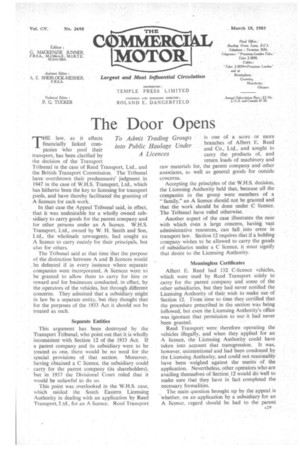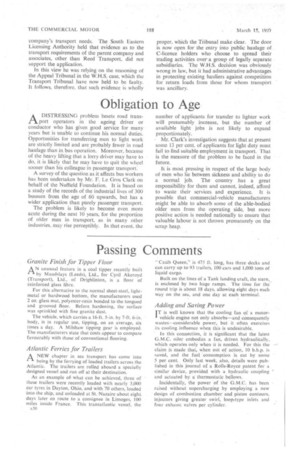The Door Opens
Page 31

Page 32

If you've noticed an error in this article please click here to report it so we can fix it.
THE law, as it affects financially linked companies Who pool their • transport, has been clarified by the decision of the Transport Tribunal in the case of Reed Transport, Ltd., and the British Transport Commission. The Tribunal have overthrown their predecessors' judgment in 1947 in the case Of W.H.S. Transport, Ltd., which has hitherto been the key to licensing for transport pools, and have thereby facilitated the granting of A,licences for such work, In that case the Appeal Tribunal said, in effect, that it was undesirable for a wholly owned subsidiary to carry goods for the.parent company and for other persons under an A licence. W.H.S. Transport, Ltd., owned by W. H. Smith and Son, Ltd., the wholesale newsagents, had sought an A licence to carry mainly for their principals, but also for others.
The Tribunal said at that time that the purpose of the distinction between A and B licences would , be defeated if in every instance where separate companies were incorporated, A licences were to be granted to allow them to carry for hire or reward and for businesses conducted, in effect, by the operators of the vehicles, but through different concerns. They admitted that a subsidiary might in law be a separate entity, but they thought that for the purposes of the 1933 Act it should not be treated as such.
Separate Entities This argument has been destroyed by the Transport Tribunal, who point out that it is wholly inconsistent with Section 12 of the 1933 Act. if a parent company and its subsidiary were to be treated as one, there would be no need for the special provisions of that section. Moreover, having obtained a C licence, the subsidiary could carry for the parent company (its shareholders), but in 1937 the Divisional Court ruled that it would be unlawful to do so.
This point was overlooked in the W.H.S. case, which misled the South Eastern Licensing Authority in dealing with an application by Reed Transport, Ltd., for an A licence. Reed Transport is one of a score or more branches of Albert E. Reed and Co., Ltd., and sought to carry the products of, and return loads of machinery and raw materials for, the parent company and other associates, as well as general goods for outside concerns.
Accepting the principles of the W.H.S. decision, the Licensing Authority held that, because all the companies in the group were members of a " family," an A licence should not be granted and that the work should be done under C licence. The Tribunal have ruled otherwise.
Another aspect of the case illustrates the ease with which even a large concern, having vast administrative resources, can fall • into error in transport law. Section 12 requires that if a holding company wishes to be allowed to carry the goods of subsidiaries under a C licence, it must signify that desire to the Licensing Authority.
Meaningless certificates Albert E. Reed had 132 C-licence vehicles, which were used by Reed Transport solely to carry for the parent company and some of the other subsidiaries, but they had never notified the Licensing Authority of their wish to make use of Section 12. From time to time they certified that the procedure prescribed in the section was being followed, but even the Licensing Authority's office was ignorant that permission to use, it had never been granted.
Reed Transport were therefore operating the vehicles illegally, and when they applied for an A licence, the Licensing Authority could have taken into account that transgression. It was, hoWever, unintentional and had been condoned by the Licensing Authority, and could not reasonably have been weighed against the merits of the application. Nevertheless, other operators who are availing themselves of Section.12 would do well to make sure that they have in fact completed the necessary formalities.
The main question brought up by the appeal is whether, on an application by a subsidiary for an A licence, regard should be had to the parent A29 company's transport needs. The South Eastern Licensing Authority held that evidence as to the transport requirements of the parent company and associates, other than Reed Transport, did not support the application.
In this view he was relying on the reasoning of the Appeal Tribunal in the W.H.S. case, which the Transport Tribunal have now held to be faulty. It follows, therefore, that such evidence is wholly proper, which the Tribunal make clear. The door is now open for the entry into 'public haulage of C-licence holders who choose to spread their trading activities over a group of legally separate subsidiaries. The W.H.S. decision was obviously wrong in law, but it had administrative advantages in protecting existing hauliers against competition for return loads from those for whom transport was ancillary.




































































































